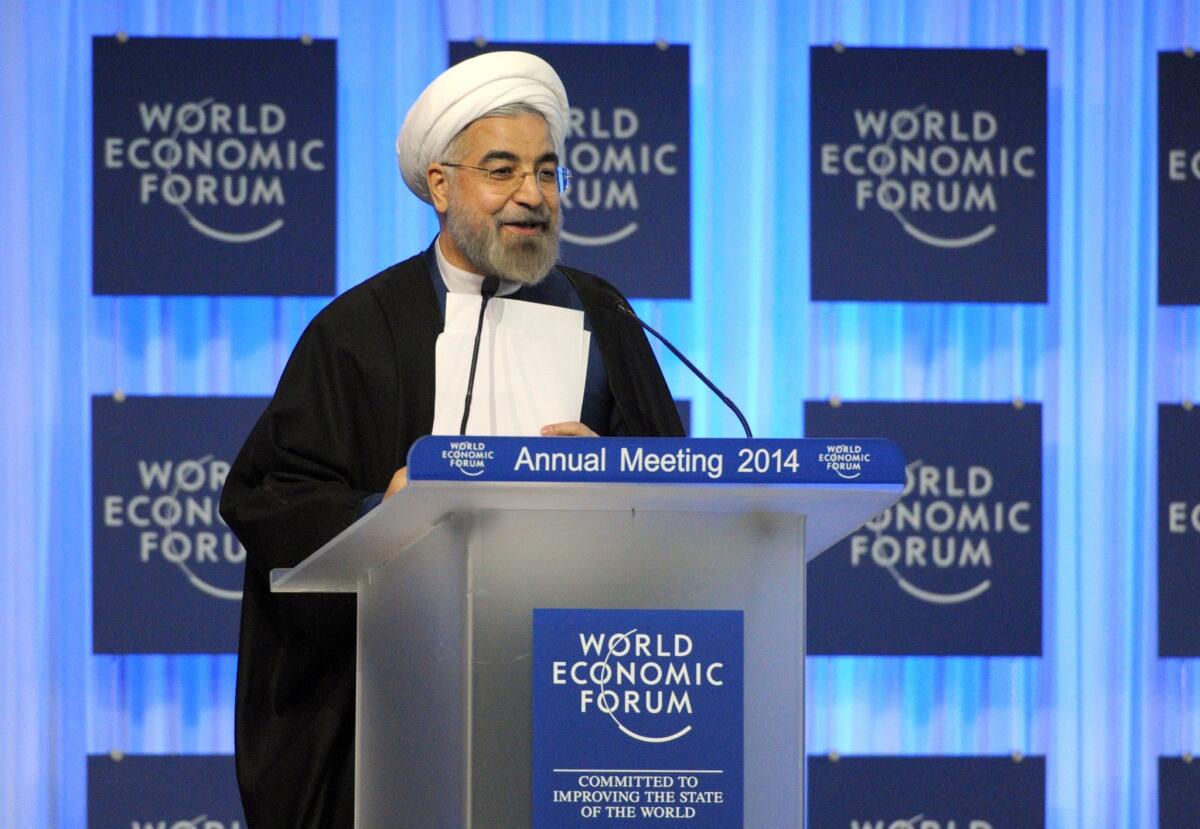Rouhani shopping a new Iran at Davos in Charm Offensive Part II

Iranian President Hassan Rouhani took the annual Davos forum by storm on Thursday, touting investment opportunities on the horizon as his country works to get sanctions lifted and hailing a new day in Tehran’s relations with the West.
He even deemed it “not impossible” that the U.S. Embassy could be reopened.
It was Part II of the new president’s global charm offensive that was launched at the U.N. General Assembly in September and produced the historic preliminary accord two months later curbing Iran’s nuclear ambitions.
“Iran has a serious will to come to an agreement with the P5+1,” Rouhani said in a speech to business and political leaders at Davos, Switzerland, referring to the nuclear negotiations under way between the Islamic republic and six world powers. “I do not see a serious impediment in the way of this agreement. The Iranian will is strong.”
Rouhani, a senior cleric within Iran’s religious hierarchy for years before contesting and winning the presidency last spring, said he was pursuing better relations with Western and neighboring countries as fulfillment of his campaign promise to break Iran out of its international isolation.
“The people of Iran opted for this approach and now they are demanding its implementation,” he said. “The Iranian people’s choice has been welcomed in the region and internationally.”
Rouhani said he saw Iran’s status in the future global economy as a country “pursuing policies of moderation, prudence and hope,” and predicted that Iran could be among the world’s top 10 economic powers in the next three decades.
He expressed the hope of improving relations and cooperation with “all countries that Iran has recognized,” a pointed exclusion of Israel.
Rouhani’s speech also pegged resolution of the bloody civil war in Syria to eradicating the “terrorists” in the country, echoing the position of Syrian President Bashar Assad, who has cast the nearly three-year-old uprising against his rule as illegitimate and foreign-inspired. Iran backs Syria, as does Lebanon’s Hezbollah militia, which has Shiite fighters in Syria to bolster Assad’s forces against the Sunni insurgents.
Iran was excluded from this week’s peace talks in the Swiss cities of Montreux and Geneva because of Tehran’s perceived bias in favor of the Syrian regime.
Israeli Prime Minister Benjamin Netanyahu seized on Rouhani’s congenial posture at Davos as untrustworthy, calling his business and diplomacy offensive a continuation of the “deception show” opened at the United Nations four months ago, the Reuters news agency reported.
But in an interview with German-language media on the sidelines of the annual World Economic Forum, Rouhani reiterated Iran’s desire for better relations with the West. He was quoted by the DPA news agency as saying it was “not impossible” [link in German] that the United States could reopen its embassy in Tehran, which has been shuttered since a 444-day hostage crisis ended there in 1980.
Tehran’s economy is still shackled by sanctions limiting its oil exports and access to international financial institutions. But the interim deal agreed to in November with the P5+1 -- the United States, Russia, China, Britain, France and Germany -- has freed up an estimated $7 billion in blocked assets and markets. That has apparently given Rouhani and his government hope of eventually rekindling trade and industry ties scuttled by the Islamic revolution 35 years ago or the sanctions imposed to censure nuclear activities over the last decade.
Rouhani also used his time in Davos to meet with European oil executives keen to lay the groundwork for resumed production and import deals if and when a permanent agreement is reached to ensure that Iran’s nuclear program remains exclusively for peaceful purposes.
“Davos is a good opportunity for the world to benefit from Iran’s economic capacities and investment opportunities,” Iran’s Fars news agency quoted Rouhani as saying upon arrival at Zurich International Airport.
Rouhani, who took office in August, met with about 30 industry leaders, mostly from oil concerns, to invite them to take advantage of investment opportunities as they arise, Bloomberg reported.
The Iranian president also met with European Commission President Jose Manuel Barroso, who urged Rouhani to continue steering his nation toward peaceful and productive relations with the outside world.
“Iran should use this window of opportunity with determination to move to a comprehensive long-term solution on the nuclear issue,” Barroso said in a statement. “This would open up the potential for an improved relationship and broader cooperation.”
Times special correspondents Alexandra Sandels in Beirut and Ramin Mostaghim in Tehran contributed to this report.
A foreign correspondent for 25 years, Carol J. Williams has traveled to and reported from more than 80 countries in Europe, Asia, the Middle East and Latin America.
More to Read
Sign up for Essential California
The most important California stories and recommendations in your inbox every morning.
You may occasionally receive promotional content from the Los Angeles Times.











